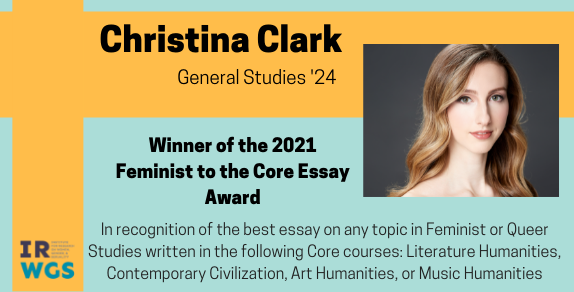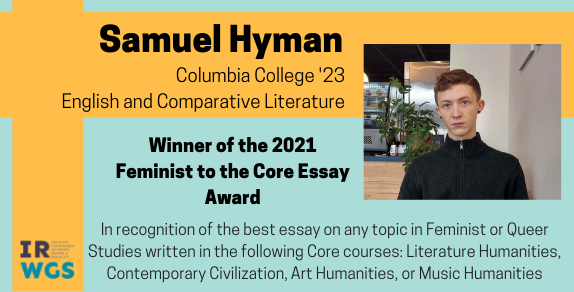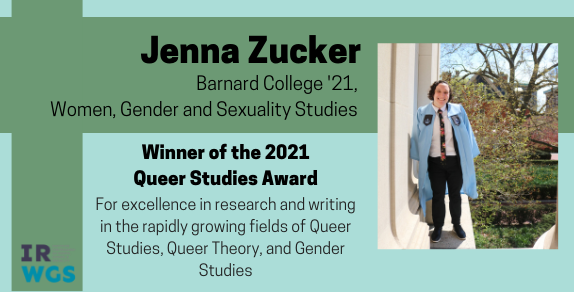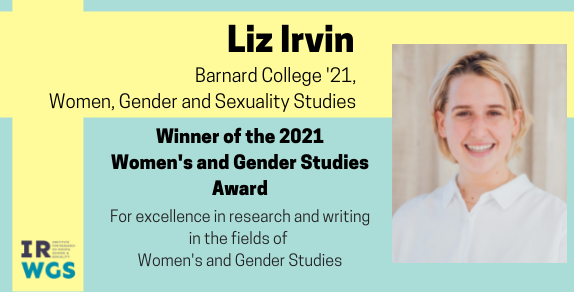2021 IRWGS Prize Winners Announced!
Congratulations to this year’s IRWGS Prize Winners
Christina Clark (GS ’24,) and Samuel Hyman (CC’ 23, English and Comparative Literature) both winners of the 4th annual Feminist to the Core Essay Award.
Their winning essays are titled “Textu(r)al Evidence: The Underlying Gender Politics of Virginia Woolf’s Musical Language in To The Lighthouse” and “Gender and Family in Marx and Engels' "The German Ideology": Heteropatriarchal Critique in both the Text and its Reading.”
Jenna Zucker (BC ’21, Women, Gender and Sexuality Studies), winner of the 26th annual IRWGS Queer Studies Award for their winning essay, “We're Jews! Jews! Jews!: Queering Third Generation Holocaust Memory.”
Liz Irvin (BC ’21, Women, Gender and Sexuality Studies), winner of the 14th annual IRWGS Women’s and Gender Studies Award for her winning essay, “The Rebiologization of Gender, Race, and Class in Environmental Toxicology Research on Low-Level Childhood Lead Exposures.”
We interviewed the students to learn more about their work and their plans for the future.

- What inspired you to focus on your topic for this submission?
As this paper was an assignment in literary analysis and close reading, the text of Virginia Woolf’s To The Lighthouse served as the main source of inspirational fodder as I wrote. The topic I chose –– Woolf’s use of musical language as a means of revealing gender dynamics–– was directly derived from patterns in diction and Woolf’s brilliant characters. However, upon reflection, I realize that my final submission ended up not only being an exercise in analysis, but also a distillation of my passions and personal circumstances.
Music, and especially classical music, is an integral part of my daily life. In addition to pursuing an undergraduate degree, I am a full-time professional ballet dancer with New York City Ballet and a choreographer. As both a dancer and a choreographer, my craft is contingent upon classical music so, largely by osmosis, I have become very passionate about this genre of music and attuned to its intricacies. Just as someone who loves ornithology might jump at the chance to analyze the presence of bird similes in Homer, it was my love for music that made me so passionate about writing this paper once I began to see this musical language in Woolf’s work.
My life has always been a synthesis of ballet and academics and this paper is no exception. While my love for classical music has been present from a young age, the Columbia Core and particularly Music Humanities enabled me to write this paper. Though I am surrounded by music every day and have always had a deep appreciation for it, it was Music Hum that gave me the vocabulary to speak formally about what I was hearing. An understanding of textures, counterpoint, melodic lines, and rhythms was critical as I analyzed Woolf’s text. The ability to find intersections and connections across different disciplines is perhaps the greatest strength of the Core Curriculum.
In addition to my preexisting passions, a couple people were sources of inspiration as I wrote this particular piece. First was my wonderful Literature Humanities professor, Eliza Zingesser. Throughout the year, whether it was in Dante’s Inferno or Dostoyevsky’s Crime and Punishment, she continually stressed the importance of sonic landscapes in the works we were reading. The act of reading is primarily visual and, if one is reading to oneself, silent. Thus, it can be tempting to focus on creating a mental image of the characters’ likenesses and the physical landscape whilst forgetting to create a mental soundscape simultaneously. While Woolf certainly focuses on sound more than other authors, without the attention to the sonic world instilled by Professor Zingesser, I likely would not have picked up on this aural index of gender dynamics.
Most profoundly, though also quite unexpectedly, the most important woman in my life––my incredible mother–– was the inspiration for this paper. I say unexpectedly because I had written almost the entire paper before I that realized my ability to understand and believe Woolf’s concept of polyphonic, female genius was predicated on seeing that exact quality in my mother–– who decided to stay at home and raise me and my three brothers. That a mother, a wife, and a woman was positioned as a genius was unsurprising to me because I had seen my mother exemplify the same polyphonic abilities as Mrs. Ramsay throughout my entire life. Once I identified this connection between my topic and my mother, it became of the utmost importance to me to articulate that female ability and genius are at once extremely meaningful when applied to family and the home and also capable of flourishing in any realm.
- How have you been able to integrate your interest in women's studies in the work you have done here at Columbia/Barnard?
Most of the courses I have taken thus far have been in fulfillment of the Core Curriculum and because I am working around a demanding professional schedule, my options are somewhat limited. However, while I have not yet been able to take a course that explicitly focuses on women’s studies, I have tried to recognize and celebrate the contributions of women in all of the courses I take. Growing up at an all-girls school and being surrounded by inspirational women throughout my life, I have always believed strong, intelligent women to be the norm rather than the aberration. In that vein, I look forward to taking more classes within the specific field of women’s studies as well as continuing to lift up the voices of women and infusing the spirit of feminism into all my future coursework.
- What are your plans for the future?
Once theaters are able to reopen, I am looking forward to returning to daily classes, rehearsals, and performances with New York City Ballet at Lincoln Center. Additionally, I intend to declare a major in either English or American Studies and take courses that further my interests in literature, law, women’s studies, and the arts. For the near term, my career aspirations remain centered around my artistic and technical growth as a ballet dancer. But in terms of my “second act” (which is what dancers often call their life after dance), I hope to go to law school and one day practice law.

- What inspired you to focus on your topic for this submission?
I think Columbia’s Core receives frequent criticisms for being heavily dominated by historically privileged authors. So when I started taking Contemporary Civilization, a class where we read almost entirely white male philosophers, I really made an effort to be aware and critical of the syllabus. I ended up focusing a lot of my energy in the class on the texts that involved, directly or indirectly, topics of gender and patriarchy. When I eventually got to read Marx and Engels’ “The German Ideology,” I had an ineffable hunch that the text was making significant feminist strides without being explicit about it—and with the essay that I submitted to the contest, I sought to make these strides clear. I also found my reading experience of that text really frustrating, because it seemed that Marx and Engels organized their argument in a really counterintuitive fashion. Accordingly, I honed in on that readerly frustration and tried to make a feminist argument about it. And I’m really happy with the result!
- How have you been able to integrate your interest in women's studies in the work you have done here at Columbia/Barnard?
When I came to Columbia my freshman fall, I was the typical student who had no idea what they wanted to do or study. It was my first formal introduction to women’s studies in an English class that I took my freshman spring that made me completely devoted to the humanities. The semester after, I took Intro to Sexuality Studies with Professor Halberstam. I’ll never forget an essay I wrote in that class where I postulated the presence of womb envy in a stereotypical war film, and how locating that presence reveals and undermines patriarchal narratives of war and gender. That project, alongside the knowledge and practices I gained in the intro class, showed me how the analysis of cultural texts’ handlings of women and gender can often expose greater societal forces at play. And now I can proudly say that women’s and gender studies rarely fail to find a spotlight in the work I do here at Columbia.
- What are your plans for the future?
I really don’t know! I’ve received so much support from my high school and college teachers and truly feel that they were fundamental in making me who I am, and perhaps I’d like to have that same impact on others as an educator. But for now, since I have another two years here, I’ll enjoy continuing to take the absolutely amazing gender studies and literature courses that Columbia and Barnard have to offer.

- What inspired you to focus on your topic for this submission?
My junior year I studied abroad with Women and Gender Studies in Europe, a program through Carleton College. We were in Berlin for one month, and we were told it was the queer center of the universe and the month would be the best of our lives. Throughout the experience I felt my Jewish, descendant, and queer identities were in constant conflict. At 'progressive' synagogues men and women did not sit together to pray, and I was beginning to identify somewhere in between. While walking home from queer events in the city, I would encounter the gold stumbling blocks on the ground which marked where Nazis persecuted and killed Jews in the city. These experiences led me to seek out fellow queer descendants to hear their stories and experiences. Often they would remark "I'm probably the only one saying this..." and it was so exciting to see the patterns and similarities among them, and assure interviewees that they are not alone in their experiences.
- How have you been able to integrate your interest in women's studies in the work you have done here at Columbia/Barnard?
I have loved how the Women's, Gender, and Sexuality Studies major allowed me to combine many of my interests. Two of my favorite courses were Feminist Theory with Professor Solomon and Gender Justice with Professor Franke. Professor Franke's course helped me see how I could apply feminist theory to the law, and helped me see myself as a potential public interest lawyer. Professor Solomon's class had a tight-knit community of students, even over Zoom, and in contrast to a lot of the very serious feminist-Holocaust work I do, I decided to do a more playful topic of analyzing the role of suburbia and feminist futurity in the show "The Babysitters Club" that was released to Netflix during quarantine in Summer 2020. These courses, among others I took both within and outside of the major, prepared me to write my thesis on queer grandchildren of Holocaust survivors. They gave me the tools to re-think and challenge heteronormative and traditional family structures, and consider a new form of Holocaust memory transmission that is 'queered' and that I term in my thesis as the "seder table model."
- What are your plans for the future?
In the future, I hope to attend law school and publish the nonfiction book I am writing about my grandmother's survival of the Holocaust, and how it has informed my life, coming of age, and identity. Next year, I will be working at Dorot with older adults and Holocaust survivors on the Upper West Side.

- What inspired you to focus on your topic for this submission?
This project, which is an investigation into the ways lead exposure is racialized and gendered in contemporary environmental toxicology research, came out of my interests in feminist science and techology studies and chemistry. The summer after my sophomore year I worked in a bioinorganic chemistry lab, where we were studying a neuronal protein that was vulnerable to the effects of lead poisoning. Diving into the background literature on lead exposure, I discovered this idea called the lead-crime hypothesis, which purports to show a link between lead exposure and crime rates in the United States. As an aspiring scientist being trained with the tools of gender studies and critical race analysis, I found this type of framing very troubling. How on earth can a chemical cause something as socially, politically, and historically constructed as crime? Around the same time I encountered Mel Chen’s work on the racialization of lead exposure, as well as Michelle Murphy’s writing on environmental toxins, and my advisor Professor Rebecca Jordan-Young’s work with Katrina Karkazis on testosterone. It was inevitable that this would become my senior thesis topic nearly two years later, as I just couldn’t get all of these questions and connections out of my mind.
- How have you been able to integrate your interest in women's studies in the work you have done here at Columbia/Barnard?
I’ve been so grateful to gain women’s, gender, and sexuality studies as a lens that can be used to understand experiences I’ve had at Barnard-- both within my gender studies classes well as in more distant topics like biology and chemistry. Women’s studies really lends itself to interdisciplinary work, which is something I’m really passionate about. What I've learned in gender studies classes has heavily influenced how I approach my coursework in the sciences-- whether that's learning about feminist critiques of science and medicine or simply gaining literacy in the ways that categories of social difference are constructed. At the same time, what I’ve learned about science has inspired and informed the work that I've done for my women's studies classes-- driving me explore how scientists understand and articulate their questions in relation to the social and structural forces that inform their frameworks.
- What are your plans for the future?
My long-term plan is to pursue an MD and hopefully find a balance between clinical work and continuing my feminist science and technology studies research. In the meantime, I’m moving to California!
